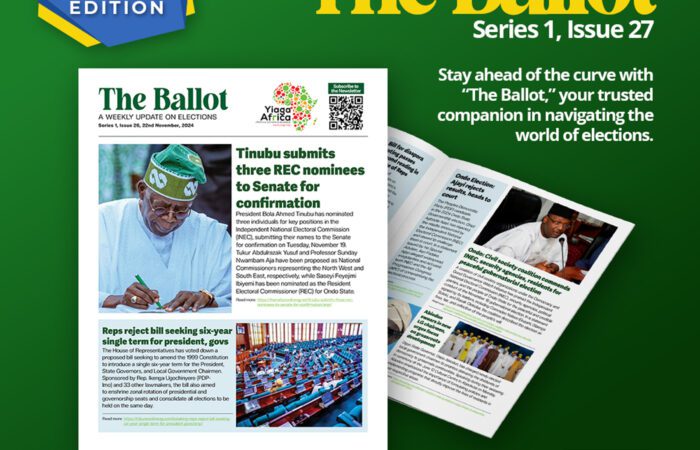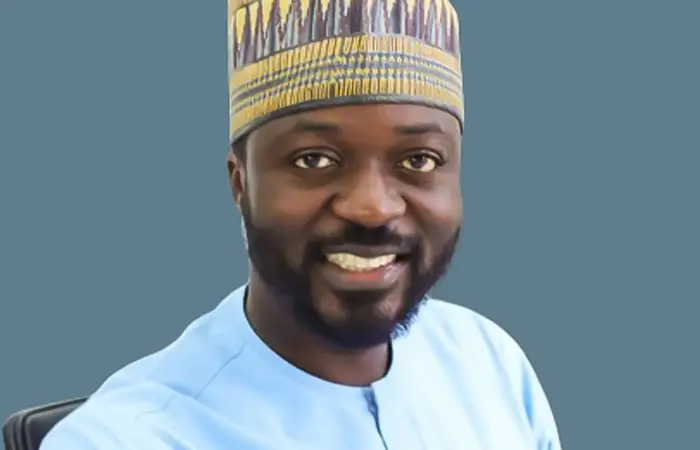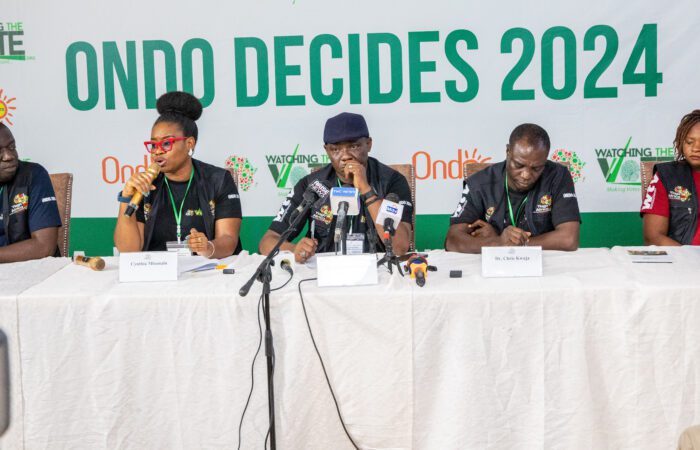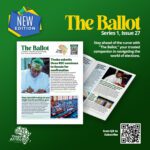Now and again, Nigeria’s electoral body, the Independent National Electoral Commission (INEC) faces a number of challenges in the performance of her functions. One of them is the large number of conflicting judgments on politics and elections. To redress the situation, the leadership of INEC visited Justice Walter Onnoghen, Chief Justice of Nigeria (CJN) a few days ago to seek his intervention in the matter.
Speaking on the occasion, the INEC boss, Prof. Mahmood Yakubu said his Commission was worried about the recurring decimal among courts of coordinate jurisdiction in cases related to pre-election, post election and leadership crises in political parties. Apart from the enormous cost implications of the conflicting judgments to the country, the INEC Chairman said the practice also creates a negative public perception for INEC. Last Wednesday’s subtle protest was not the first by the electoral body. In July last year, the Commission reportedly sent a petition to the office of the Chief Justice of Nigeria over the order of an Abuja Federal High Court restraining it from continuing with the recall process on the Senator representing the Kogi West Senatorial District, Dino Melaye.
The court had asked INEC to maintain status quo pending the determination of the motion on notice filed by the Melaye’s Counsel. A National Electoral Commissioner, Prof. Okechukwu Ibeanu, who explained INEC’s position, said the CJN’s attention was drawn to the order to check a precedent that could prevent the Commission from carrying out its responsibility in future. It would be recalled that during the tenure of the immediate past Chairman of INEC, Prof Attahiru Jega, the Commission had cause to adopt the same approach with respect to unresolved election cases concerning the April 2011 general elections in the country.
At that time, Jega reportedly wrote to the Chief Justice to draw attention to what he called an “emerging trend in the political process where ex-parte orders are granted at the top of a hat by judges.” The resort to the approach seems to imply that INEC thinks the judiciary is one of her main problems hence she deems it wise to constantly appeal to the CJN to direct judges on the subject accordingly. Considering that judges are professionally trained to handle the settlement of disputes, we suspect that if they do their jobs according to INEC’s prescription, the country may be in a greater dilemma than what is currently worrisome to the electoral body.
Luckily, Chief Justice Onnoghen put the subject in correct perspective when he merely repeated what he told the Senate during his clearance for the post of CJN that “conflicting judgments are bound to happen because the processes are different and the lawyers can adopt any of the choices and the system of Nigeria Judiciary has a way of regulating itself.” The Judiciary is home to us all and we are all free to go there as often as we choose, to present whatever case interests us even if the case hardly makes sense. Our judges must take time to listen to us all and determine who is right from who is wrong and who makes sense and who does not. Even those who may have come to deliberately waste the time of the court, must be heard before being disallowed from continuing to abuse court process.
In addition, politicians who have cases in court are represented by lawyers who are knowledgeable enough to determine the expedience of litigation. They are also officers of the court who in addition to managing the cases of their clients are obliged to assist the court to perform well. It is true that on its face value, courts of coordinate jurisdiction should not waste out time dealing with the same subject. It is also true that cases which have found their way to the Supreme Court ought not to be raised again at the courts below but the beauty of the due process of law is that such breaches can only be struck out by the courts; and not by critics or analysts.
While it is similarly true that society has much to gain if the heavy burden of litigation on election matters is reduced or prevented, INEC needs to tread softly. Indeed, the appeals she is making on the subject when properly construed may adversely affect our justice delivery system as judges may no longer give fair hearing to cases in order not to give discomfort to INEC. Under the circumstance, persons who would ordinarily have relied on the courts as channels for ventilating grievances may begin to employ extra-judicial strategies to deal with opponents. If care is not taken, we may reduce court cases and inadvertently increase political assassinations which may greatly challenge government’s main purpose of protecting lives and property.
Of course, everyone would prefer excessive litigation to killings. We agree that conflicting judgments are quite nauseating and that they are deliberately done by some corrupt judges. Of course there are judges who sell judgments but in fairness, they are few and we can support INEC to appeal to the CJN to look out for more of such bad judges and take them out of the system thereby reducing irritating judgments. But that does not appear to be all that needs to be done. Conscious efforts must also be made to fish out corrupt INEC officials whose activities instigate excessive election petitions.
From just the plea bargain cases involving election personnel during the 2015 elections alone, it is likely that many people who were declared winners at that election may not have scored majority of votes. The argument that conflicting judgments also contribute to the poor public perception of INEC is in earnest not strong because there is sufficient contributory negligence on the part of INEC to make people think poorly of her. For instance, the Commission is yet to come to terms with basic issues such as the adequacy of men and materials for election as well as capacity to commence the voting process on schedule irrespective of whether the election is holding nation-wide or in only one state. When it is realised that INEC is yet to get beyond the use of temperamental card readers, many people are not likely to imagine that the unacceptable trend of conflicting judgments on elections matters is worse than the slow pace of improvement in the conduct of Nigerian elections.
Source: Vanguard






